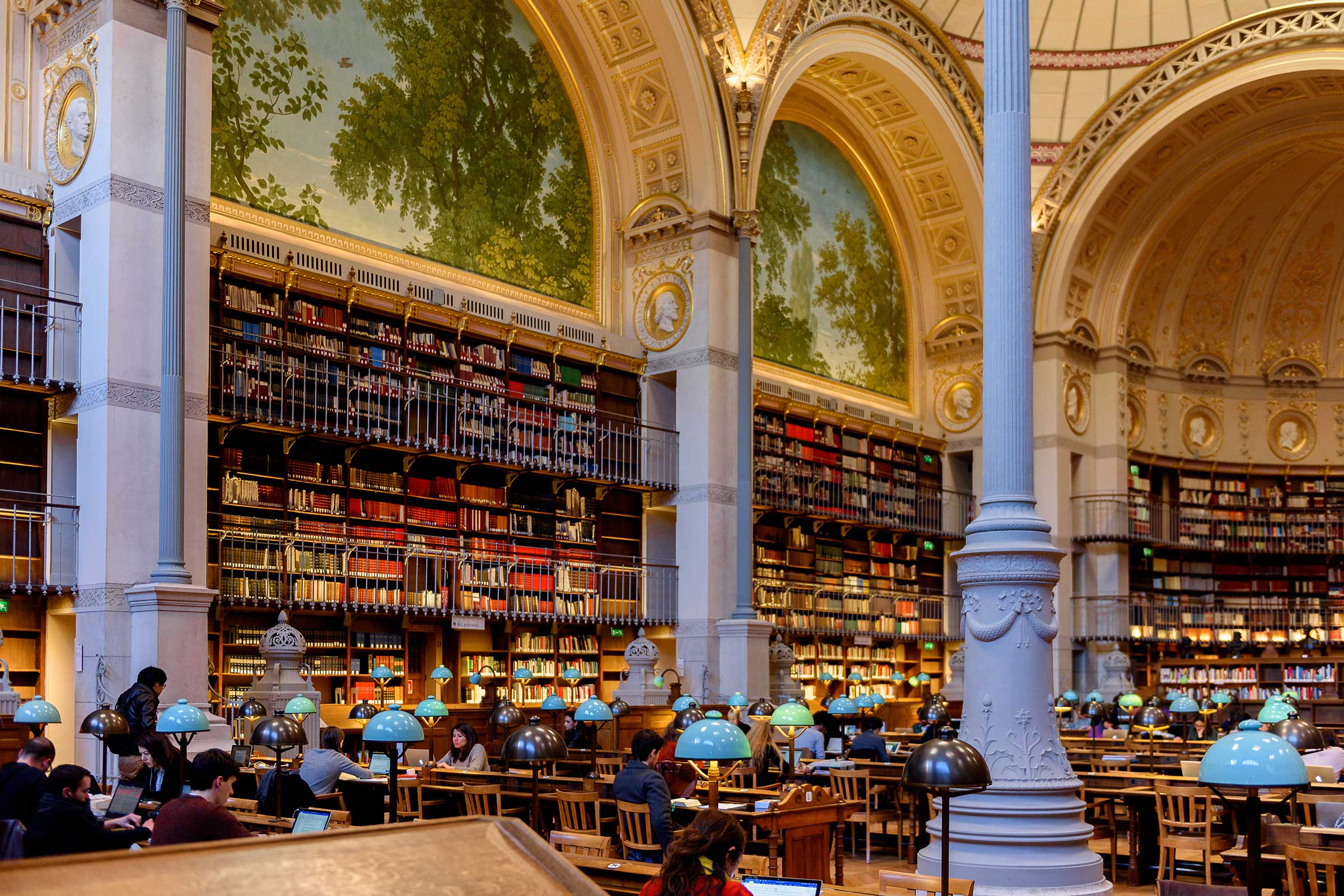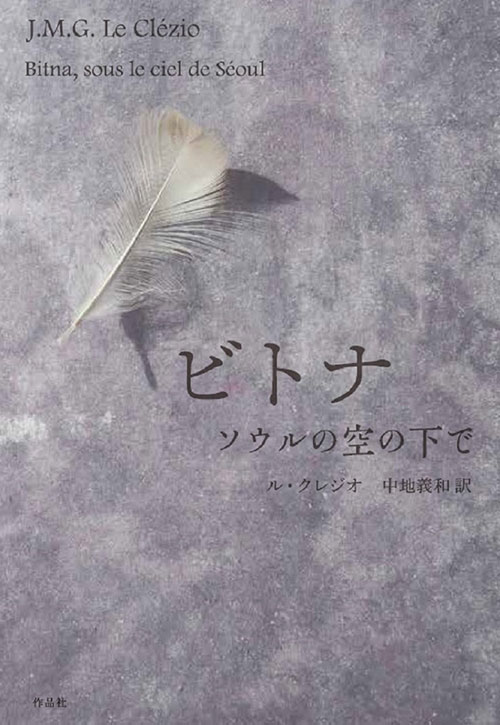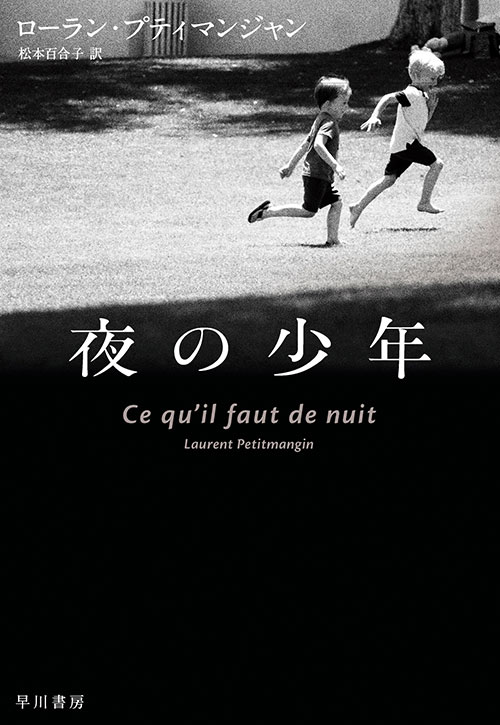
National library of France, Rue de Richelieu, Paris, France, interior
The Children’s Book Fair in Montreuil is a major literary festival in multiple forms with over 250 invited authors, a European exhibition of children’s illustrations, around 450 exhibitors, small and large publishing houses, press publishers, associations, and organizations for reading. The program of the fair specializes in Children’s Books. The visitors can discover albums, novels, comics, documentaries, manga, press magazines and more in a period between November and December.
Every year in May, the Étonnants Voyageurs festival is attended by approx. 250 authors from around the world and nearly 60,000 visitors, who come to Saint-Malo to attend the 3-day festival. Established in 1990 Étonnants Voyageurs unites a rich program consisting of meetings, debates, literary cafés, film screenings and exhibitions. Several prizes are awarded during the festival.
Since 2005, Lyon has hosted the Quai du Polar festival dedicated to fans of thriller, detective novels and crime in April. Long considered a minor genre, the detective novel is now one of the most popular literature genres in France. Authors from all over the world are presenting their works and signing autographs. Furthermore, there are specialists holding conferences, directors showing their films, games and entertainment for the whole family, concerts, theaters, and many other activities linked to the genre.
The festival for comics has been held annually in Angoulême since 1974 and is considered the most important comic festival in Europe. Around 200,000 visitors attend the festival every year in January for four days in January. Among others, well-known comic artists are invited to the festival. Since it takes place all over the town, and is celebrated in many different areas, Angoulême became France’s “City of Comics”.
For 3 days nearly 350 authors and publishing houses of all sizes come to meet a large audience at the Paris Book Festival. It is annually held in April at the Grand Palais Éphémère where the first Edition of the Paris Book Fair took place around 40 years ago. The festival promotes the diversity of French publishing and the creativity of French authors through workshops for families, artistic performances, concerts and meeting between authors and readers.
The Prix Goncourt is a French literary prize awarded by the Académie Goncourt since 1903. Originally honoring only the best French-language novel of the year, the Prix Goncourt is now also awarded in four other categories. Although today it is only endowed with symbolic 10 EUR, the Prix Goncourt is highly regarded among authors because it has a strong influence on the sales success of their work.
The Prix Femina is a literary prize, established in 1904 by writers for the magazine La Vie heureuse (today known as Femina). The prize honors French-language works written in prose or verse, by both women and men but the jury is exclusively female. The winner is announced annually on the first Wednesday of November.
The Prix Décembre is a French literary prize awarded annually since 1989 for a novel, short story or essay in French. The winner is chosen by a jury of twelve, whose members change regularly. Due to the changing patrons, the prize money has decreased in the last years, since 2021 the prize is endowed with 15,000 EUR.
The Prix Médicis is awarded annually in November to an author who has not yet achieved the prestige commensurate with their talent. The award goes to a work of fiction in the French language and was founded in 1958 by Gala Barbisan and Jean-Pierre Giraudoux. In 1970 the Prix Médicis étranger was added to recognize a book published in translation and later an award for non-fiction works like essays was added.
The Prix Renaudot was created in 1926 by journalists and literary critics and named after Théophraste Renaudot, founder of La Gazette (an influential weekly newspaper). The Renaudot literary prize is awarded annually at a ceremony in a Parisian restaurant to the author of an outstanding original novel published during the previous year. There are also prizes in different categories like essay, paperback and a readers’ prize for high school students.
The Inalco (Institut national des langues et civilisations orientales) Vo-Vf Translation Prize rewards a translation into French from any of the 103 languages taught at Inalco, published and distributed in France. With the launch of the prize in 2019, in partnership with the Vo-Vf festival, Inalco wishes to highlight its expertise in translation, as well as recognizing the work of the translator and their publisher in the dialogue between the world’s literatures. The prize is endowed with 2,500 EUR.
The SGDL (société des gens de lettres) Translation Revelation Prize was created in 2017. It is part of the eight awards of the Prix SGDL Révélation. The jury is composed of authors who are members of the SGDL Committee and translators. Endowed with 2,000 EUR, it rewards translation into French by an emerging translator, regardless of the language translated.
The Konishi Foundation for International Exchange, since its inception in November 1983, has been actively committed to the cultural exchange between Japan and France. The Japanese-French Translated Literature Award was established in 1993, to honor outstanding, published translated books from French to Japanese, and vice versa.
Founded in 1981 the Prierre- François Caillé Prize for Translation rewards a translator at the beginning of their career in publishing. It was created by the French Society of Translators in tribute to Prierre- François Caillé. The prize aims to encourage aspiring talents and is endowed with 3,000 EUR. Potential candidates are translators with a maximum of three translated and published works.
The Grand Prix SGDL de traduction, created in 2011, rewards a translator for their work on occasion of its publication. It is endowed with 6,000 EUR by the Société des Gens de Lettres. In 2017 the SGDL Grand Prix pour l’œuvre de traduction has replaced the 6,000 EUR prize and is now awarded to a work of an outstanding translator, regardless of language. It is not necessarily linked to a translation published during the year. Since 2019 the prize has been co-financed by the French Ministry of Culture and is endowed with 15,000 EUR.
The Villa Gillet is located in Lyon, in the Parc de la Cerisaie. It is a European and international center for contemporary writing and is first and foremost a place for international meetings, literary dialogues and new formats of intervention of the writer in the public space. With its residencies, it gives a voice to writers, thinkers and artists. There are eight residencies supporting international and youth projects in different fields of culture.
Ciclic Centre-Val de Loire, the regional agency for books and images, implements a public cultural service born from the cooperation between the Centre-Val de Loire Region and the State. The agency is committed to working alongside creators for the realization of their works and promotes the presence of artists, authors, filmmakers in the area: writing residencies, an animated film studio, and financial support that triggers the realization of projects. Since 2014, a support scheme for associated authors has made it possible to award residency grants intended for authors who partner with a venue in the Centre-Val de Loire region.
The Maison des écrivains et de la littérature offers a database of writers’ residencies, reflecting the diversity of situations in terms of duration, financial conditions, location, target audience and projects. They generally include a creative project, with or without a commissioned text, and frequently a cultural project with meetings, workshops and more. Some are permanent, often set up in unique heritage sites and some residencies do not offer a venue but are understood as an approach associating an author and a venue through a project.
The Centre national du Livre offers several residencies for writers, illustrators, scriptwriters and translators. The aim of the residencies is to enable authors to pursue their creative work while participating in a mediation program developed jointly with the host organization. The conditions differ depending on the type of the residence chosen.
The purpose of this residence for translators from French to foreign languages is to develop the network of professional translators from French or one of the France languages into foreign languages by offering them the opportunity to stay in France to carry out a translation project. The granted amount for the residence is 2,000 EUR per month, the translators can stay up to 2 months.


